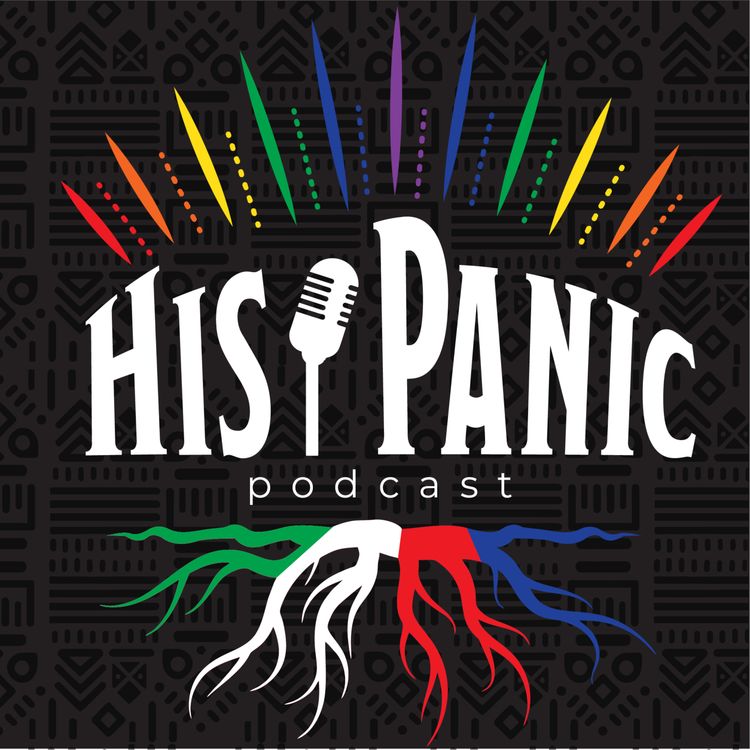Share

His Panic Podcast
Mental Health
Season 1, Ep. 7
•
We speak with Kristina Delhomme, a Licensed Professional Counselor at Ascending Light Counseling. Drawing on her work as a therapist, we discuss her panic and then deep dive aversion to therapy for men, and Latinos. We talk about what counseling looks like and how it could help. We discuss all topics of mental health from teen suicide and even grief. Tune in and share the episode with your friends as mental health has become a very important topic in today's information overload culture.
More episodes
View all episodes

5. Forget the Alamo
59:52||Season 3, Ep. 5This episode centers on Forget the Alamo and challenges the deeply rooted mythology surrounding Texas independence and the Alamo.Rather than a heroic last stand against the forces of Antonio López de Santa Anna, the Alamo is discussed as a moment of mistrust and miscalculation. Many inside the mission were warned by fellow Mexicans that Santa Anna was advancing, yet chose not to believe them. That decision, more than a grand defense of liberty, led to martyrdom that was later mythologized.The conversation reframes Texas independence not as a parallel to the Boston Tea Party, but as an economic project. At its core, independence was driven by the desire to preserve slavery, embed racial hierarchy into law, and protect a cotton based economy that depended on dehumanized labor. Cotton was becoming a global commodity, Texas land was uniquely suited for plantation agriculture, and slavery was essential to that model. The mythology that followed helped settlers morally justify profiting from stolen land and enslaved people.The episode also explores how history is curated, not just lived. We discuss the roles of Clara Driscoll and Adina De Zavala, whose efforts saved the Alamo but reflected competing visions of which stories deserved preservation. That tension mirrors earlier political fractures, including the fallout involving Lorenzo de Zavala following Article 9 of the Texas Constitution, which formalized racial exclusion and severed ties with Mexican citizens who once belonged to the land.Ultimately, the episode argues that the Alamo myth endures because it obscures uncomfortable truths. Texas was founded less on freedom and more on protecting slavery, racial hierarchy, and economic power. These realities continue to shape identity, politics, and belonging today.
4. The Maduro Matrix in Venezuela
47:15||Season 3, Ep. 4In this episode, Herman is joined by Eric Holguin, South Texas organizer and candidate for Texas State Representative, for a wide-ranging and unfiltered conversation on U.S. foreign policy, international law, and the rapidly shifting political landscape at home.The discussion centers on the recent U.S. military operation in Venezuela that resulted in the capture of Nicolás Maduro and members of his family. Herman and Eric unpack whether the action was legal under international law, the absence of congressional authorization, and how the operation has been received globally—particularly in Latin America and Europe, where concerns over sovereignty and precedent remain high. They explore historical parallels, including past U.S. interventions, and question whether strategic interests—especially oil—are driving policy more than democratic principles.The conversation also addresses what they see as glaring contradictions in U.S. policy: the mass deportation of Venezuelan asylum seekers, the pardon of a convicted Honduran dictator tied to drug trafficking, and the selective application of justice and accountability abroad. Herman raises concerns about how these actions erode U.S. credibility on the global stage, especially as China continues to expand its economic and geopolitical influence.Turning to domestic politics, Herman and Eric examine voter frustration, rising economic anxiety, and the impact of executive overreach on democratic institutions. Eric shares on-the-ground insights from South Texas and the Rio Grande Valley, highlighting shifting voter behavior, post-election regret among some Trump voters, and why Democrats continue to struggle with coordination despite competitive down-ballot results.The episode closes with a candid assessment of Texas politics, the importance of coalition-building, and what it will take to rebuild trust—both internationally and at home—after years of political chaos and distraction.#HisPanicPodcast#PodcastPolitics#PoliticalPodcast#ProgressiveVoices#LatinoPodcast#TexasPolitics#CivicEngagement
3. Deconstructing Boundaries of Faith, Could God be a She?
59:46||Season 3, Ep. 3🎙️ When God Is She: Reimagining the Divine Beyond GenderIn this episode, Herman and Pastor Shelley explore the bold and beautiful idea of referring to God as “she,” challenging patriarchal traditions and inviting listeners to see the Divine through a more inclusive lens. The conversation dives into the theological, emotional, and cultural layers of gendered language in faith — asking how our words shape our view of God and ourselves.Pastor Shelley shares her personal journey of deconstructing faith, embracing womanist theology, and discovering a mothering spirit in God that transcends gender. She reflects on her congregation’s reaction at St. Peter’s, where using “she” for God was met not with resistance but with gratitude from those who felt newly seen in the Divine image. Together, she and Herman explore scriptural references that reveal both maternal and paternal aspects of God — ultimately affirming that God is beyond binaries.Their discussion widens to include LGBTQ+ inclusion, empathy in ministry, and the dangers of using faith as a weapon. Pastor Shelley describes her work through Be Out Ministries, a movement dedicated to helping people of all backgrounds reconcile faith and identity. Herman shares how his own faith journey — and his upcoming book about his uncle’s murder as a gay man — have deepened his understanding of grace, justice, and spiritual truth.The two also tackle the mistranslation of the word “homosexual” in the 1946 NIV Bible, exploring how linguistic errors have shaped modern prejudice. They discuss the documentary 1946, which exposes how ancient Greek terms like arsenakoitai and malachoi were misinterpreted — a mistake that fueled decades of harm toward queer Christians.At its heart, this episode is about love over judgment, curiosity over certainty, and compassion over conformity. Herman and Pastor Shelley remind listeners that true Christianity isn’t about who’s right or wrong — it’s about who’s loved and who’s left out. They challenge the church to reflect the radical inclusivity of Jesus, who met people where they were, not where others thought they should be.Takeaway: Faith evolves when we allow discomfort to teach us. Language matters because it reveals who we believe God can be. And perhaps, in calling God “she,” we begin to heal parts of ourselves that patriarchy taught us to silence.
2. PRIDE 2025
28:14||Season 3, Ep. 2In this powerful PRIDE Month episode, His Panic Podcast exposes how LGBTQ+ visibility and Latino immigration are being weaponized as distractions by political elites to protect corporate interests. We unpack how both queer and immigrant communities are targeted—not because they’re threats, but because their existence challenges the American caste system. From book bans to ICE raids, we connect the dots between perception, power, and oppression. Most importantly, we reclaim the true meaning of PRIDE—not as superiority, but as resistance, healing, and visibility.
1. Covid Chaos or Just Trump Chaos?
52:00||Season 3, Ep. 1In this episode, we unpack the question many Americans are now asking: was the chaos of 2020 really about the pandemic, or was it simply the result of Donald Trump’s leadership style? As Trump begins another term in office, we’re seeing the return of disarray — without COVID to blame.We compare the early months of his current presidency to the COVID-era White House: attacks on institutions, firings of federal watchdogs, dismantling of safety oversight (like the FAA), vague and bizarre public statements, and ongoing legal drama. The atmosphere of uncertainty, division, and disorder feels eerily familiar — even without a global health crisis.We challenge listeners to consider: maybe the chaos wasn’t circumstantial. Maybe it’s a feature of Trumpism itself — fueled by disruption, confusion, and political theater.Tune in as we explore how leadership sets the tone for the nation and how the current unrest echoes not a virus, but a personality at the center of power.
10. CEO Murder, Morals & God Made Me Gay
56:39||Season 2, Ep. 10Podcast Summary: Morality, Faith, and Purpose with Influencer Mike MaeshiroIn this episode, we explore the moral complexities of the alleged murder of the UHC CEO, a case that has sparked heated debate. Some see Luigi, the alleged perpetrator, as a Robin Hood figure, but we agree that while his motives may seem altruistic to some, murder is morally indefensible. The discussion delves into themes of justice, morality, and the societal pressures that fuel such narratives.We then pivot to a conversation with our guest, Mike Maeshiro, an influencer, speaker, and advocate for LGBTQ+ Christians. Mike shares how his experiences with Christianity and the challenges of reconciling his queerness with his faith led to what he calls "Christian PTSD." These struggles ultimately gave him purpose, inspiring him to speak for others who feel marginalized within faith communities. Now, Mike dedicates his work to helping others process their experiences, come out, and embrace their identities.About Mike Maeshiro:https://www.mikemaeshiro.com/Mike is a thought leader in the intersection of faith, identity, and authenticity. Through his speaking engagements, online presence, and mentorship, he challenges traditional Christian narratives to create space for LGBTQ+ individuals. His work centers on fostering healing and empowerment for those grappling with exclusion and trauma in religious contexts.This Week in History:We also highlight pivotal moments in history:For LGBTQ+ History: The first observance of Transgender Day of Remembrance on November 20, 1999, honoring those lost to anti-transgender violence.For Latino History: November 20, 1910, marks the start of the Mexican Revolution, a fight for justice and equality that reshaped Mexican-American identity.For Women’s History: November 26, 1869, saw the founding of the American Woman Suffrage Association, a key step toward securing voting rights for women.
9. Labels, Perception and Frustration
01:10:11||Season 2, Ep. 9In this episode, we dive into how labels are used to deflect attention from systemic inequality and the tangible frustrations faced by everyday Americans. From the inability to purchase a home or afford rent to the struggle of putting food on the table or taking time off, we explore how these realities fuel unfocused anger.We discuss how terms like "personal responsibility" and "lifestyle choices" shift blame away from systemic issues, while narratives like “hard work always pays off” obscure the structural barriers holding people back. Labels are weaponized to redirect anger into cultural wars, distracting from the wealth agenda that normalizes inequality, suppresses education, and widens economic gaps.We connect these frustrations to daily impacts on housing, food insecurity, and work-life balance, showing how the system is designed to benefit the few at the expense of the many. Finally, we emphasize solutions, including advocating for policies addressing wage stagnation, housing affordability, and access to paid leave.Join us as we challenge divisive labels, uncover systemic roots of frustration, and call for a collective push toward equitable change. Let’s move beyond being “right” and focus on finding the truth that unites us.
8. Faith Over Fear: Christian Post Trumpatic Stress
01:04:48||Season 2, Ep. 8Faith over Fear: Christian Post Trumpatic StressIntroduction: Support Despite ContradictionsOver 80% of white evangelical Christians supported Donald Trump in both 2016 and 2020, despite his criminal record, history of bankruptcies, and alignment with greed. Religious leaders heavily influenced this support, framing Trump as a defender of Christian values while emphasizing single issues like abortion and ignoring broader principles like compassion and care for the marginalized.Voting Against Marginalized GroupsOverlooked ValuesMany Christians prioritized political alignment over values of love and inclusion, directly impacting vulnerable groups. Anti-LGBTQ+ rhetoric in particular has fostered "Christian PTSD," a form of religious trauma driving LGBTQ+ youth away from the Church and contributing to high rates of depression and suicide.Data: LGBTQ+ youth from highly religious families are twice as likely to experience depression and suicidal thoughts compared to those in supportive environments (The Trevor Project, 2022).Exodus from FaithThis hypocrisy has alienated young people, leading to an exodus from Christianity as they see a disconnect between the teachings of love and the Church’s political actions.Anti-Immigrant Stances and the Caste SystemTrump’s anti-immigrant policies appealed to voters aiming to reinforce their position in the social hierarchy by pushing immigrants further down the “caste ladder.”Data: A 2020 Pew study revealed that 60% of white evangelicals view immigrants as a “burden,” ignoring biblical teachings about welcoming strangers. Latino communities have often felt excluded from religious spaces due to this rhetoric, despite their deep ties to faith.Hate or Economic Self-Interest?Trump capitalized on economic fears while promoting policies like the Tax Cuts and Jobs Act (2017), which primarily benefited the wealthy and left little for middle- and lower-income families. Christian alignment with these policies often reflected personal financial gain over community welfare, further fueling perceptions of hypocrisy.Tariff Warning: Economic ConsequencesTrump’s proposed tariffs could significantly increase costs for everyday goods, disproportionately affecting low-income households. Key impacts include:Clothing: Up to 18% price hikes.Electronics: Laptops, smartphones, and gaming consoles could rise by 25-45%.Groceries: Staples like coffee and beef may see notable price increases.These tariffs could amplify inflation and economic inequality, leaving the majority of Americans worse off.This Week in HistoryHarvey Milk Elected (1977): First openly gay elected official in California, a milestone for LGBTQ+ representation.Bracero Program Ends (1964): Shaped U.S. immigration policy and impacted thousands of Mexican workers.Susan B. Anthony Votes Illegally (1872): A pivotal act in the women’s suffrage movement.ReflectionsThe Christian vote for Trump highlights a troubling divergence from core teachings of compassion and justice. This alignment has harmed marginalized groups, driven young people from the Church, and deepened societal divisions. Moving forward, Christians must reflect on the broader impact of their choices and strive to embody the values they preach.
7. Mass Deportation? Please Hold On Line 1
01:08:26||Season 2, Ep. 7Navigating the Complexities of Immigration Policy in AmericaImmigration is a topic that affects countless lives across the United States, especially within Latino and marginalized communities. Our recent podcast episode delved into the current landscape of immigration policy, discussing its history, recent changes, and the impact on individuals and families.Understanding Immigration in the Post-Trump EraThe Trump administration's hardline stance on immigration introduced significant changes that reshaped America's approach to asylum, family reunification, and deportation. Policies like "Remain in Mexico" and restrictions on asylum have left lasting impacts, and many of these changes continue to influence immigration policy today, even under new leadership.DACA: A Lifeline Under ThreatFor nearly a decade, the Deferred Action for Childhood Arrivals (DACA) program has provided young undocumented immigrants brought to the U.S. as children—often called "Dreamers"—with protection from deportation. However, DACA's future remains uncertain. Court battles and political shifts constantly threaten the program, leaving Dreamers and their families in a state of limbo, worried about losing the stability they’ve worked so hard to build.The Economic Impact of ImmigrationOne of the less discussed but crucial aspects of immigration is its economic impact. Immigrants contribute to the workforce, often filling essential roles in healthcare, agriculture, construction, and hospitality. They pay billions in taxes, support social security, and bring diversity to the job market. Yet, misinformation often paints immigrants as a burden on the economy, ignoring their role in boosting productivity and lowering consumer prices by providing affordable labor.Myth vs. Reality: Immigrants and Public SafetyA persistent myth claims that immigration increases crime. Studies, however, have consistently shown that immigrants—both documented and undocumented—are less likely to commit crimes than native-born citizens. Yet, this stereotype continues to fuel anti-immigrant sentiments and affects policies that unjustly target immigrant communities.Moving Toward a Compassionate, Fact-Based PolicyFor America to thrive, we need an immigration policy that is grounded in reality, not fear. Policies must reflect compassion, acknowledging the human stories behind the statistics. The families separated at borders, the Dreamers waiting for stability, and the countless individuals seeking better lives all deserve humane treatment and fair opportunities.Final Thoughts: Finding Common GroundOur podcast’s goal is to foster understanding and break down barriers. While immigration is a divisive topic, it’s essential to look at the facts and recognize the contributions immigrants make to our communities and economy. We believe in finding common ground, understanding each other’s perspectives, and working toward policies that honor our country’s values of diversity and opportunity.